December 22, 2025 | 00:31 GMT +7
December 22, 2025 | 00:31 GMT +7
Hotline: 0913.378.918
December 22, 2025 | 00:31 GMT +7
Hotline: 0913.378.918
On July 5, in An Giang province, the Institute for Agricultural Technology Research (Astri) held the inauguration ceremony for its Southwestern Branch - Astri Mekong.
Representatives from the An Giang provincial government, local departments and agencies, experts, scientists, and businesses operating in high-tech agriculture attended the event.
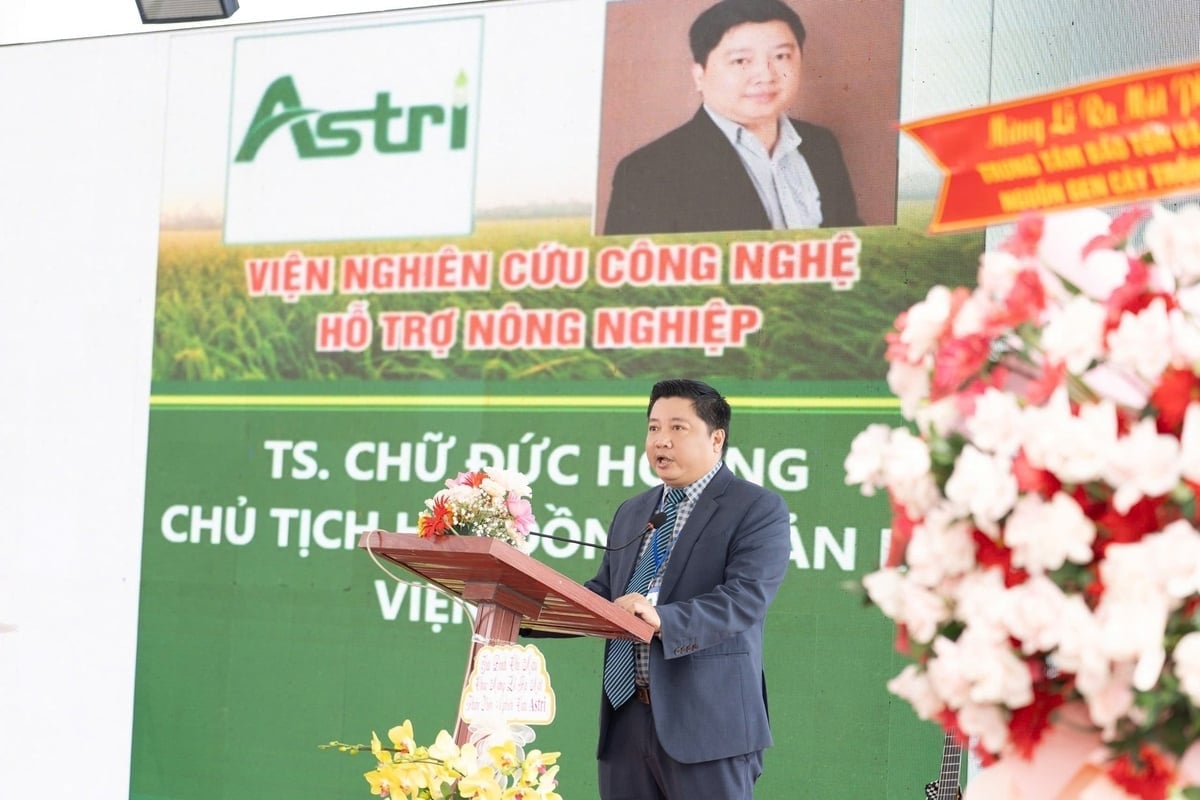
Mr. Chu Duc Hoang, Chairman of the Astri Institute’s Governing Board, speaks at the event. Photo: Ngoc Chinh.
Dr. Tong Van Hai, a representative of the Astri Institute, stated that the establishment of the Astri Southwestern Branch marks a strategic milestone in the deployment of technological solutions to promote sustainable agriculture, circular economy practices, and climate change adaptation in the Mekong Delta region - an area currently facing serious challenges such as saltwater intrusion, prolonged droughts, and the degradation of arable land.
The branch is expected to become a hub for research and technology transfer, contributing to agricultural innovation across the region. Its core operations will focus on three main directions. First and foremost is the development of smart and precision agriculture through the application of advanced technologies such as the Internet of Things (IoT), artificial intelligence (AI), and drones. These innovations aim to optimize production processes, conserve resources, and enhance farming efficiency.
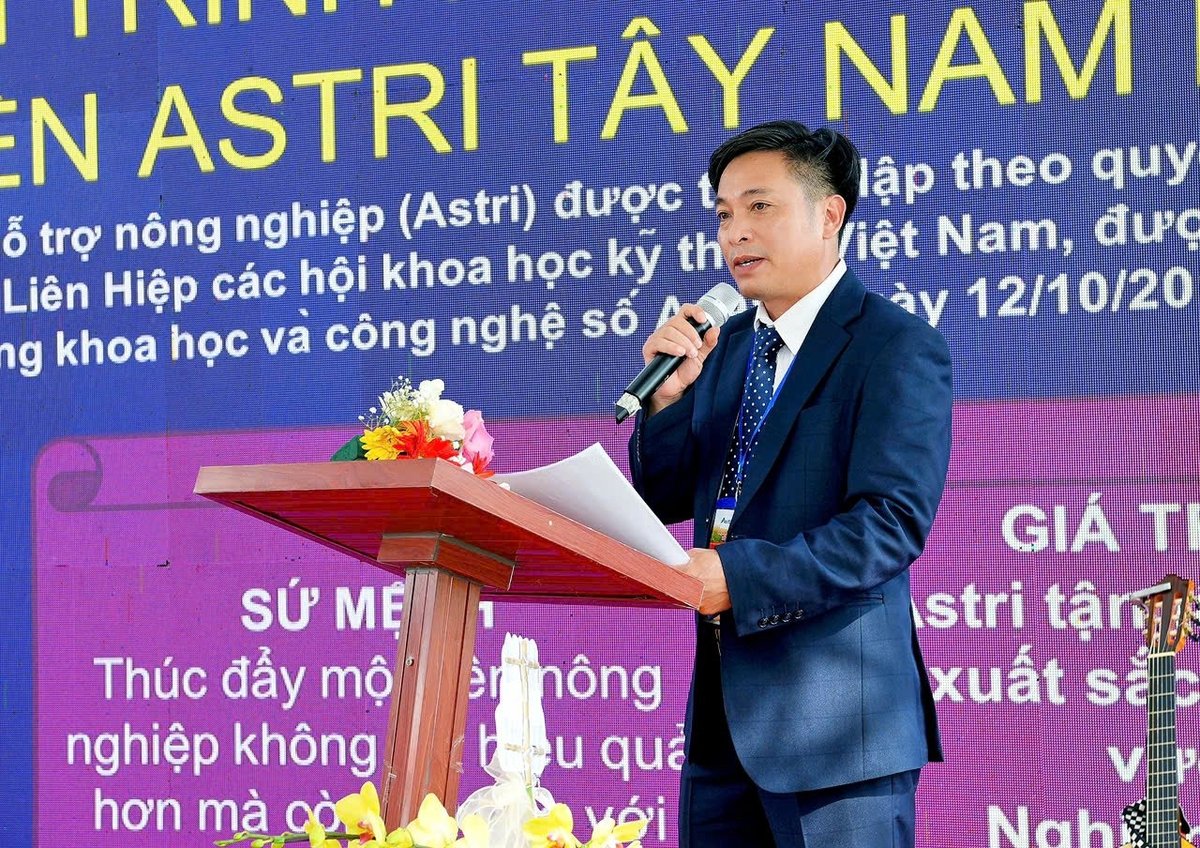
Mr. Phan Van Hai, Deputy Director of the Astri Institute and Director of the Astri Southwestern Branch, delivers a speech. Photo: Ngoc Chinh.
In addition, the branch will promote low-emission farming models, effectively utilize agricultural by-products to create high value-added products, and work toward the establishment and trading of carbon credits in accordance with international standards.
Lastly, one key objective is to enhance the value chains of local agricultural products by improving crop varieties, refining cultivation processes, advancing post-harvest processing, and gradually building sustainable agricultural brands for the Mekong Delta.
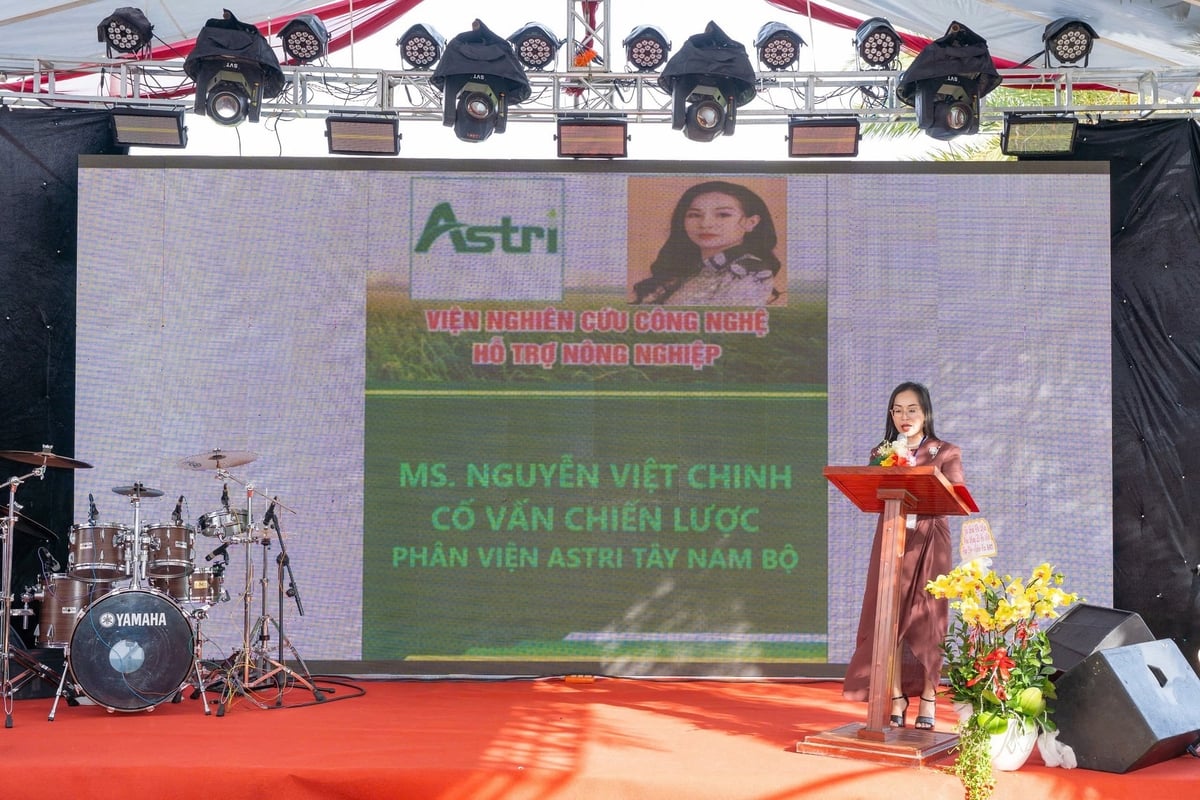
Ms. Nguyen Viet Chinh, Strategic Advisor to the Astri Southwestern Branch, delivered a speech. Photo: Ngoc Chinh.
Notably, within the event's framework, the Astri Institute and Global Organic Clean Agriculture Co., Ltd. officially announced and signed a strategic cooperation agreement to launch the project “High-Tech Rice Cultivation Area Linked to Carbon Credit Development” on 1,500 hectares in An Giang province.
This initiative is regarded as one of the largest integrated models in Vietnam that combines the production of high-quality rice with Industry 4.0 technologies and a comprehensive MRV (Measurement - Reporting - Verification) system to generate internationally recognized carbon credits. More importantly, the project opens up a new development pathway for Vietnam’s agricultural sector by creating an additional, stable revenue stream for both farmers and agribusinesses through carbon credit trading. It also supports Vietnam's national commitment to achieving net-zero emissions by 2050.
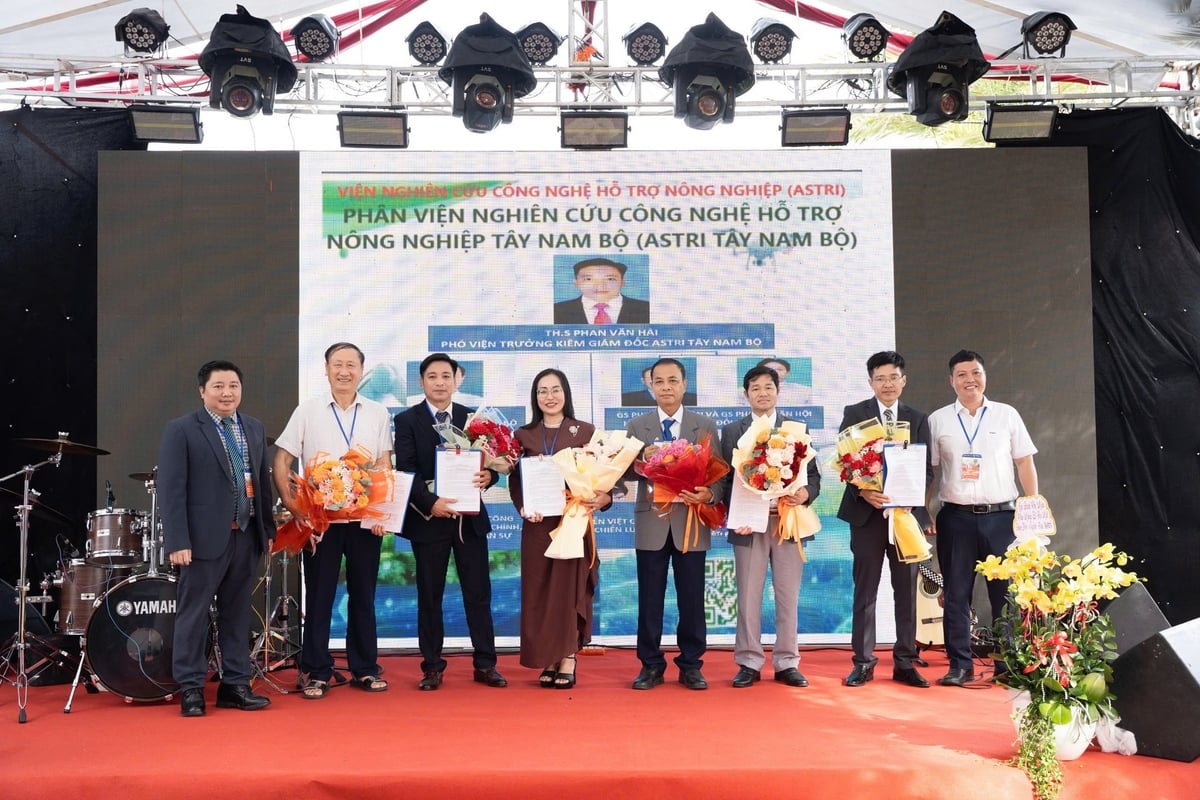
The inauguration ceremony of the Southwestern Branch of the Institute for Agricultural Technology Research. Photo: Ngoc Chinh.
"We are not merely establishing a branch institute. We are planting a seed of change and hope in the Mekong Delta," emphasized Dr. Tong Van Hai. "The Southwestern Branch will serve as a catalyst for bringing the most advanced technological solutions into practice, transforming the challenges of climate change into opportunities for sustainable development. It will deliver dual value, both economic and environmental, to the region."
He also added, this is an important milestone in advancing innovation and sustainability in Vietnam’s agricultural sector. The event highlighted the institute’s expanded presence in the Mekong Delta and its commitment to delivering high-tech, climate-resilient solutions tailored to the region’s unique challenges.
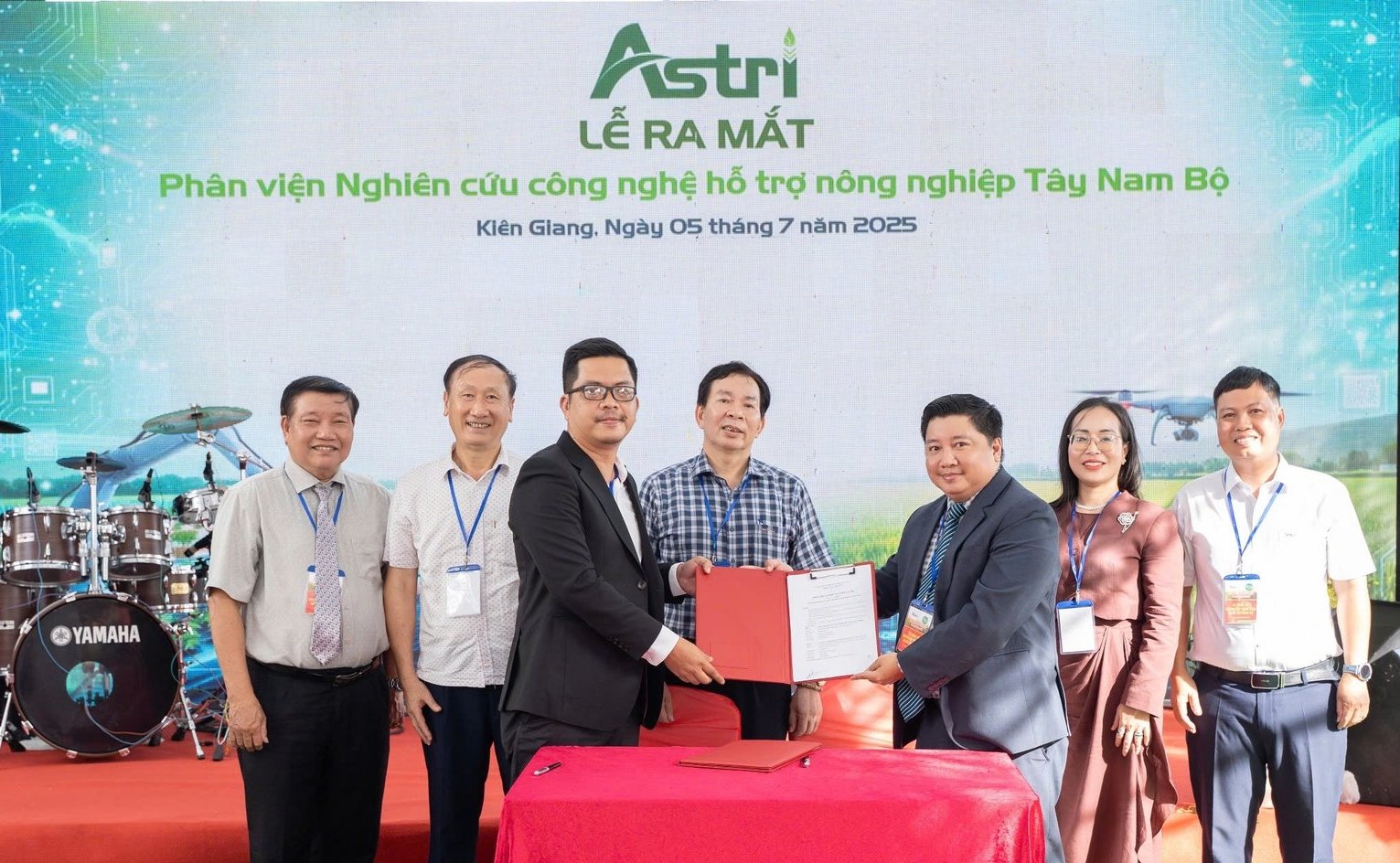
The signing ceremony between the Astri Southwestern Branch and Global Organic Clean Agriculture Co., Ltd, marking a pivotal step in formalizing their strategic partnership. Photo: Ngoc Chinh.
The establishment of the Astri Southwestern Branch also serves as a clear testament to the Astri Institute’s long-term vision of building an innovation-driven agricultural ecosystem. It reflects the Institute’s commitment to advancing public-private partnerships and strengthening domestic capabilities in high-tech agriculture.
The agreement signifies a shared commitment to promoting sustainable, technology-driven farming models, with a particular focus on high-tech rice cultivation and carbon credit development in the Mekong Delta.
More than just the launch of a new research facility, this event marks a significant milestone in fostering deeper connections between science, business, and local communities. It symbolizes a shared commitment to developing a green, smart, and internationally competitive agricultural sector that is resilient to climate change, driven by technology, and rooted in sustainable development principles.
Translated by Kieu Chi
/2025/12/18/4844-4-223614_595.jpg)
(VAN) Building on the 'Large-Scale Rice Field' project, An Giang is developing high-quality rice raw material zones, strengthening consumption linkages, and standardizing processes to meet market requirements.

(VAN) With support from KOICA, livestock sector is developing the regulatory framework for management based on South Korea’s experience.
/2025/12/17/0042-2-075234_14.jpg)
(VAN) In Vinh Long, high-quality, low-emission rice models are being scaled up from cooperatives, helping reduce production costs, increase farmers' incomes, and protect the environment.

Professor Nguyen Duc Ngu, the third generation of leaders since the establishment of Vietnam’s Hydrometeorology sector has witnessed and lived through the long arc of its development.

(VAN) Climate change, saline intrusion, and unsustainable farming practices are depleting agricultural land in the Mekong Delta. Restoring soil health is a key solution for the future of agriculture.

(VAN) Agroforestry coffee not only enhances coffee quality but also helps farmers in Quang Tri enter carbon credit market with high expectations.

(VAN) Towards Net Zero 2050, fertilizer manufacturers are proactively developing bio-based products, reducing emissions, and demonstrating responsibility to the environment.